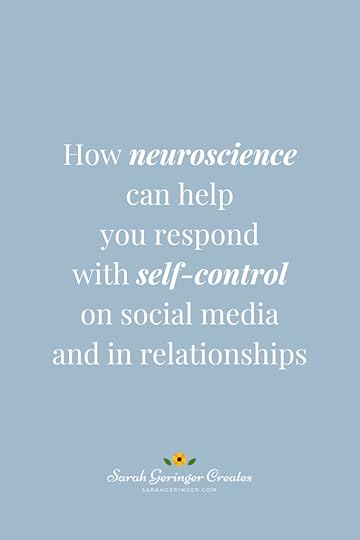How Neuroscience Can Help You Respond with Self-Control
How neuroscience can help you respond with self-control is a topic that I learned about last year that changed everything for me. Here’s what I learned that can help you.
How Neuroscience Can Help You Respond with Self-ControlLast year I watched a teaching for work that changed everything for me.
It quoted Harvard research that proves when we are confronted with negative information, these are our responses:
First, defensive.
Second, accusatory.
This is because our primal brain is first to react in self-protection, even if we are being confronted with the truth.
It takes 10-15 seconds for our prefrontal cortex to be activated. The prefrontal cortex is the “mature” brain – the one that makes rational, informed decisions. It takes time to kick in and provide a response rather than a knee-jerk reaction.
What I do now is give my brain some time to process before responding. In a heated moment I’ll say to the person, “Give me a second,” rather than being silent, which could potentially make the situation worse. Then I take a few deep breaths to calm down and let the thoughts and feelings move from my primal brain to my prefrontal cortex.
If I’m sitting in front of a screen and feeling my hackles rise up, I take 10-15 seconds to breathe and think before typing.
Doing this can help you connect with reason before responding. It gives you time to ask yourself questions such as, “How might this make the other person feel?” or “Do I really want to post this?”
Now I recognize my defensive and accusatory thoughts, which often aren’t even applicable to the situation. They come from a kicking, screaming 2-year-old inside who only knows how to say “No!” and “Mine!” and “Bad!” That’s normal behavior for 2-year-olds, but inappropriate for anyone old enough to read this post.
This bit of neuroscience will help you not just on social media, but at work and home too.
Responding rather than reacting takes practice, but I promise it will help your self-control grow exponentially.
How neuroscience can help you respond with self-control - gain practical help you can use today. #intentionalliving #personalgrowth #selfcontrol #neuroscience
Share on X


If you’re launching a book in 2025 or beyond, be sure to book a call with me HERE to discuss your book launch. I’ve had over 80 clients since 2022, and I’d love to speak with you soon. I’m also taking on new clients for editing, coaching (over 200 clients since 2020), and virtual assistance/social media management. You can learn more and book a call with me on THIS PAGE.
If you liked this post, I would appreciate your shares on social media!Also, if you make a purchase from any of the links on this post, I receive a small commission at no additional cost to you. Thank you for your support!
amzn_assoc_placement = "adunit0";amzn_assoc_tracking_id = "sarahgeringer-20";amzn_assoc_ad_mode = "manual";amzn_assoc_ad_type = "smart";amzn_assoc_marketplace = "amazon";amzn_assoc_region = "US";amzn_assoc_linkid = "3ea3cfd41cd61dec5b42fdef47788543";amzn_assoc_asins = "1684262100,1547042761,1520704496,B01LZ0X9F3";amzn_assoc_title = "My Books on Amazon";amzn_assoc_search_bar = "true";
I send my weekly newsletter Tea on Tuesdays at 3:00 p.m. Central time every Tuesday. I write an exclusive devotion for you each week that I share with you first.
To receive the newsletter, please subscribe below. I can’t wait to share personally with you each week!
Want to know more about me before you sign up? You can read my story here and learn more about my books here. By signing up, you are agreeing to the terms of my privacy policy.The post How Neuroscience Can Help You Respond with Self-Control appeared first on Sarah Geringer.





